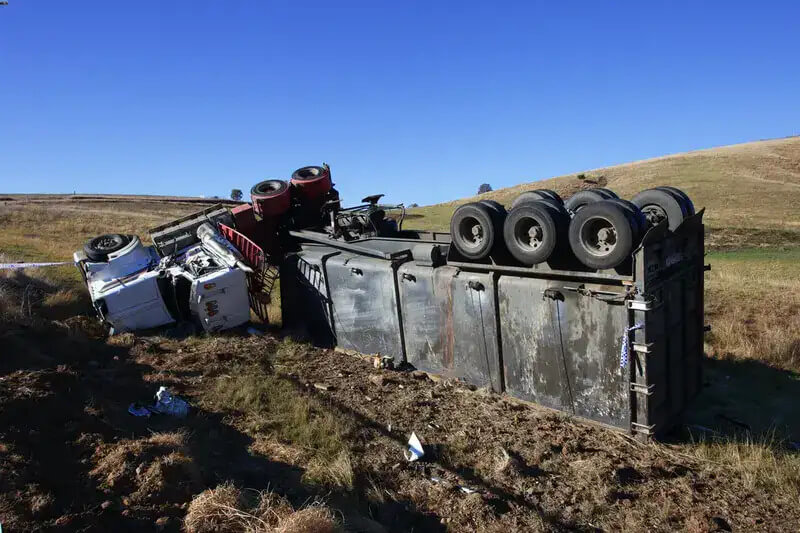Casey is a founding partner at River Run Law Group. Casey has tried numerous cases across the Commonwealth in both General District Court and Circuit Court. He has earned millions of dollars for his clients through trials, mediations, and settlements.
According to the National Safety Council, in 2019, there were 5,005 trucks involved in fatal accidents, and 118,000 were involved in accidents resulting in injury.
The sheer size of a semi-truck makes it difficult to stop an accident once it has been set in motion.
Truck accidents can result in life-threatening injuries, and those that are not life-threatening may be long-term or permanent.
Individuals who walk away from a collision with a truck without major injuries should consider themselves very lucky because that is rare.
If you or someone you love has been in a truck accident, River Run Law can help you recover the compensation you deserve.
Our experienced team of Virginia personal injury attorneys understands the complications that can arise from a Virginia truck accident, and we are dedicated to compassionate representation that gets results.
Contact us today to get started.
Common Causes of Truck Accidents in Virginia
There are a lot of circumstances that could result in a Virginia truck accident. Here are the 9 most common causes of truck accidents.
1. Driver Fatigue
Trucking is crucial for many businesses, and truck drivers are often under a lot of pressure to get their cargo to its destination.
There are federal laws that require drivers to get a certain amount of rest, including limitations on how many consecutive hours they can drive.
Despite these regulations, some drivers may choose to stay on the road, making it dangerous for everyone around them.
2. Distracted Driving
With the exception of a solo road trip, truck drivers are behind the wheel for much longer than most people. When all the scenery looks the same, it can be difficult to remain attentive.
Behaviors such as texting or other activities on a cell phone are common distractions that are often thought to be the number one cause of accidents in Virginia and other states.
Unfortunately, this applies to both truck drivers and drivers of passenger vehicles.
3. Weather Conditions
You can’t control the weather, and sometimes the weather can cause less-than-ideal driving conditions. Icy, heavy rain and snow are catalysts for some of the most dangerous conditions.
Trucks may have difficulty stopping or slowing in these conditions, and the driver may experience visual impairment.
4. Driving While Intoxicated
Truck drivers in Virginia are held to a higher standard when it comes to alcohol intoxication. The legal blood alcohol concentration (BAC) limit for most drivers is .08%.
However, for commercial drivers, it is .04%. Narcotics and illegal stimulants are also a problem in the trucking industry.
5. Poor Road Conditions
Drivers cannot control the condition of the road. In most cases, large potholes, missing road signs, erosion, and other bad road conditions should be maintained and repaired by the government.
Construction and confusing traffic signals and signs are not under the truck driver’s control but may cause accidents.
6. Vehicle Maintenance
Drivers are required to do pre and post-trip safety checks before starting their vehicles. If done properly, these checks prevent a significant amount of breakdowns.
Issues like worn tires or brakes can turn an easy trip into a catastrophe. Vehicle maintenance may also be the responsibility of the mechanics who take care of the vehicle.
7. Uneven Cargo Load
When cargo is not loaded correctly, it can shift while the truck is in motion. Shifting cargo can fall into the roadway or even cause the truck to tip over.
Cargo loading is often the responsibility of the trucking company or even a third-party loading company—but in some situations, the driver will load their own vehicle.
8. Reckless Driving
There are many different types of careless behavior that could constitute reckless driving.
Any intentional violation of traffic laws such as speeding, ignoring traffic signals, tailgating, and other traffic offenses can cause dangerous situations on the road, especially for semi-trucks.
9. Lane Changes
Though there is nothing wrong with changing lanes, semi-trucks have quite large blind spots.
Though ultimately the fault of the truck driver, passenger vehicle drivers should understand safety precautions when driving near semi-trucks.
If you cannot see yourself in the truck’s side mirrors, the driver probably cannot see you. This is especially true when driving on the right-hand side of a truck.
Therefore, the safest option is to assume you are not visible.
Who Is Liable in a Virginia Truck Accident?
To determine who is responsible for the accident, lawyers typically look to the police report, eyewitness testimony, and possibly an expert accident reconstructionist.
Trucking companies are generally responsible for the actions of their drivers, as long as the driver is an employee as opposed to an independent contractor.
But depending on the circumstance of the accident, there may be multiple parties liable for your injuries, including:
- The truck driver,
- The trucking company,
- Truck parts manufacturer,
- The cargo loader,
- Truck mechanic, or
- A government municipality.
Virginia adheres to the rule of pure contributory negligence, which means that establishing liability is crucial.
Under this system, if the plaintiff bears any degree of fault—even if it is only 1%—they are barred from civil recovery.
The truck driver, trucking company, or other defendant’s insurance provider is sure to try and establish that you were negligent, so they don’t have to pay your damages.
Experienced Virginia truck accident lawyers can help make sure that you are not found unfairly liable.
Contact a Truck Accident Lawyer Today
If you or a loved one have been injured in a Virginia truck accident, it is important to take action quickly.
The truck accident attorneys at River Run Law understand how difficult it can be to recover from a traumatic event like a truck accident.
You deserve compassionate, zealous representation as you pursue the compensation you deserve. Contact us to schedule your case consultation.
Where You Can Find Our Richmond Office



